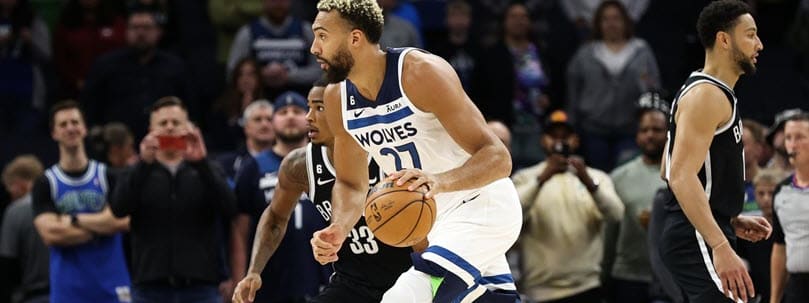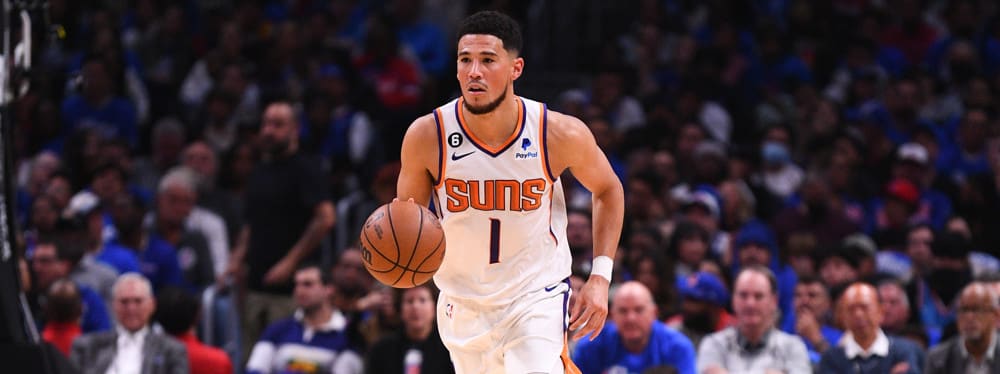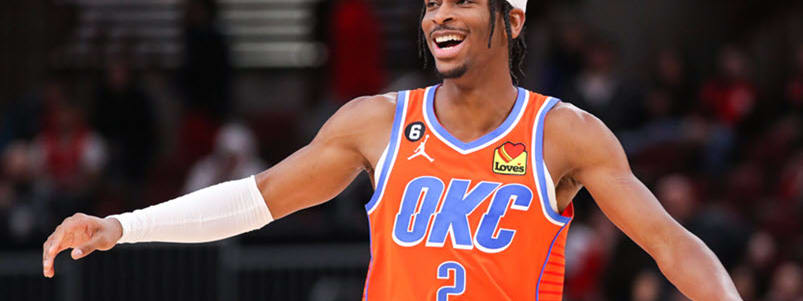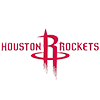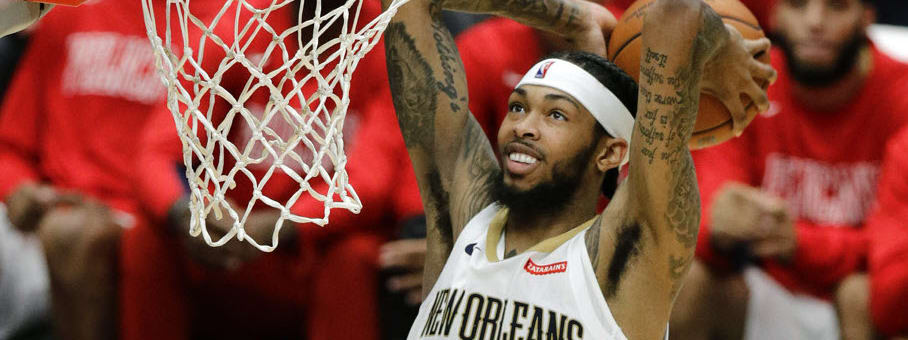Recent RotoWire Articles Featuring Reggie Bullock
See More
Despite playing upwards of 30 minutes per night during the 2022-23 season, Bullock somehow managed to rank outside the top 200 in standard fantasy formats. He averaged just 7.2 points, 3.6 rebounds and 1.4 assists -- astonishingly low given the time he spent on the court. Now in San Antonio, this could be the season we see his role scaled back. The Spurs are in a rebuilding phase, placing the 32-year-old Bullock on the outside looking in when it comes to a long-term role. He will be battling Doug McDermott and Cedi Osman for backup minutes, a battle that he could very well end up winning come opening night, thanks to his ability to defend the perimeter. With that said, he is unlikely to consistently see minutes in the mid-to-high 20s, making him a player to forget about in standard leagues.
Bullock closed out the 2021-22 season outside the top 200 in eight-category roto leagues -- the second time he has done so in the past three years. In 68 games, he saw his scoring fall to just 8.6 points per game despite logging 28 minutes. While his playing time could increase slightly moving forward, Bullock offers zero upside outside of his ability to connect from the perimeter. As he has been throughout his career, Bullock seems destined to again be a frequent visitor to the waiver wire. Managers in standard leagues need not concern themselves with him during fantasy drafts, with his limited skillset providing little enticement when it comes to late-round value.
Bullock signed a three-year deal with the Mavericks after averaging 10.9 points on 41.0 percent shooting from three last year with the Knicks. Throughout his career, Bullock has played relatively the same role for all five teams he has suited up for, and he has never been fantasy relevant -- finishing in the top 200 of overall fantasy scorers just twice. However, last year, the North Carolina product was able to produce his best fantasy season -- 124th overall -- in large part due to a career-best 64 starts and a career-high 3.4 rebounds. It is unlikely that Bullock improves on that production as Luka Doncic siphons a large portion of rebounds from the guard position, but if he is able to maintain his strong rebounding numbers he has a chance of being a fringe fantasy scorer in 12-team leagues next season. The 30-year-old will likely be the first reserve for Tim Hardaway and Dorian Finney-Smith and will see plenty of open shots playing alongside Doncic. The Mavericks boasted one of the best offenses in the league last season, and there will be plenty of shots to go around -- particularly for guys who shoot over 40.0 percent from three like Bullock has done three times throughout his career. But a slight downturn from last year's 30.0 minutes per game seems likely.
After spending 2018-19 with the Pistons and Lakers, Bullock latched on with the Knicks in 2019-20 to join his fifth NBA team in seven seasons. The UNC product underwent back surgery in the offseason that caused him to miss the first 33 games of the season, and he appeared in just 29 games the rest of the way. Expected to face some competition for playing time, Bullock was still a regular rotational player who logged 23.6 minutes while averaging 8.1 points, 2.3 boards, 1.4 dimes and 1.3 triples. Bullock made his mark as a three-point specialist across his last two seasons, but he experienced a five-year low in three-point shooting percentage. Bullock started 19 of his 29 games, though his statistical contributions in those games were not much different than games in which he came off the bench. Reportedly healthy to start the new season, Bullock should once again be a regular contributor off the bench for New York, and he makes an interesting late-round selection in fantasy drafts.
After a strong 2018-19 campaign had Bullock in line for a strong payday with the Knicks, back problems emerged and the swingman was forced to undergo surgery to address a cervical disc herniation. As a result, Bullock signed a cheaper deal with the Knicks and will now be forced to miss about a month of the regular season. Once healthy, Bullock should have the opportunity to be a key contributor off the bench, as he is coming off a strong campaign split with the Pistons and Lakers. Bullock really shined in Detroit, shooting 38.8 percent from three on his way to averaging 12.1 points per game as a full-time starter. The only thing that could stop Bullock from playing a bigger role in New York would be the team's likely emphasis on the development of its younger talent, as R.J. Barrett will certainly be the full-time starter at shooting guard while the likes of Allonzo Trier and Damyean Dotson will also be fighting for minutes in the backcourt. But if the Knicks are looking to be as competitive as possible, a healthy Bullock should serve as a key member of the rotation.
Bullock started the 2017-18 campaign on a five-game suspension and then struggled to stay in the rotation for roughly the first two months of the season before finally being given a chance for extended run. By mid-December, Bullock earned a starting role and ended up working with the top unit in 52 of the career-high 62 games he played in. His workload would become even more secure following the Blake Griffin addition, as that sent Avery Bradley to Los Angeles in the corresponding move and opened up a much clearer path to playing time on the wing. As a result, Bullock nearly doubled his time on the court with 27.9 minutes per game compared to 15.1 a year prior. The added time on the court allowed Bullock to up his production across the board and he finished the year with averages of 11.3 points, 2.5 rebounds and 1.4 assists. Most notably, however, was his work as a three-point threat, as Bullock knocked down 2.0 deep balls per game at a blistering 44.5 percent clip. Heading into the upcoming season, Bullock appears primed to reclaim his role in the top unit, though it's unclear if that will be alongside Stanley Johnson again, or if coach Dwane Casey will go with a guy like Luke Kennard or Glenn Robinson. He split last season between both shooting guard and small forward and will likely continue to play both positions depending on which of the aforementioned players is on the court as well. Bullock doesn't provide the coveted multi-category production that Fantasy owners look for, but his work beyond the arc should bring him into consideration as a three-point specialist in deeper leagues.
Bullock's second year with the Pistons, and fourth season overall, was his best yet. He averaged a career-high 15.1 minutes per game, while boosting his averages of 3.3 points and 1.8 rebounds in 2015-16 to 4.5 and 2.1, respectively. He continued to shoot well from the field at 42.2 percent, while also showing a reliable three-point stroke once again at 38.4 percent from deep. His improvement was rewarded with a two-year, $5 million contract extension in the offseason. However, that doesn't necessarily mean Bullock's in for a much bigger role. The Pistons let Kentavious Caldwell-Pope go in free agency, but then traded for Avery Bradley, who should take on the bulk of the shooting guard minutes. The team also selected Luke Kennard in the first round of the 2017 NBA Draft, which could further complicate Bullock's path to playing time. While Bullock can play both spots on the wing, look for a similar or slightly smaller workload during the upcoming campaign, which should keep him off the radar in the majority of standard formats.
Drafted in the first round by the Clippers in 2013 as a prototypical 3-and-D wing, Bullock's career has yet to really get off the ground, as he's only appeared in 116 games over three seasons while averaging 10.0 minutes per contest. The Pistons acquired him from the Suns last summer and didn't really hand him many opportunities behind starting wings Kentavious Caldwell-Pope and Marcus Morris, with Bullock finishing the campaign with just 37 appearances and averages of 3.3 points, 1.8 rebounds, 0.7 assists and 0.6 three-pointers in 11.6 minutes per game. If there's a silver lining, it's that Bullock made a bigger impact when top reserve Stanley Johnson was injured for seven games in the second half. During that pivotal stretch in late February and early March, Bullock helped the Pistons surge back into playoff positioning while playing 23.3 minutes per game and averaging 9.0 points on 55 percent shooting from the field. His role declined when Johnson returned, but with coach Stan Van Gundy stating in the offseason that he hopes to reduce the minutes loads for Caldwell-Pope and Morris, Bullock could see his playing time increase in 2016-17. It's probably not going to be significant enough for Bullock to produce lasting fantasy value, but he could make for a decent DFS target or short-term pickup if either Caldwell-Pope or Morris fall victim to an injury.
After spending the first two seasons of his career dealing with being injured or stuck at the bottom of the depth chart on the Clippers and then the Suns, Bullock was traded to the Pistons this summer as part of the Marcus Morris salry dump. It's almost not even worth reviewing Bullock's stats in the NBA over the last two seasons, because he barely played. Where he did get a little run was in the D-League. Through four games with the Bakersfield Jam last season, Bullock averaged 23.8 points, 3.0 three-pointers, 9.8 rebounds, 2.8 assists, 1.5 steals, and 1.3 blocks. Those numbers are not the best representation of what he'll become in the NBA, but they can help highlight some of the 6-7 guard/forward's best skills. He's a competent rebounder and wonderful shooter with great size for defending the wing positions. Though the Pistons seem to have their core wing rotation metered out between Kentavious Caldwell-Pope, Marcus Morris, and Stanley Johnson, Bullock could edge his way into the conversation during training camp.
Entering his second NBA season, Bullock is unlikely to play a significant role in the Clippers' rotation out of the gate. If the opportunity arises, he has value as a potential three-point threat in the Clippers' potent offense. However, some serious breaks would have to go his way, or he would have to show massive improvement to force the coaching staff's hand to receive more than spot minutes. Expect to see him on the floor in garbage time or taking a stint in the D-League to get some run.
Bullock was drafted 25th overall in this summer's draft, but joins a Clippers team with strong wing depth, likely limiting his involvement during his rookie campaign. When he sees the floor, Bullock is a knock-down shooter and a decent rebounder for his position as well.

